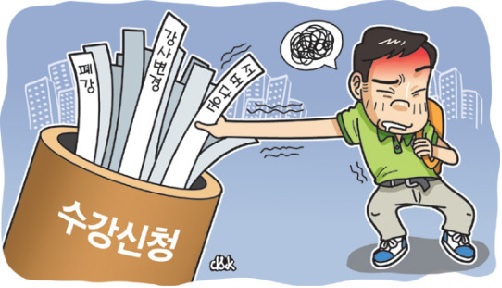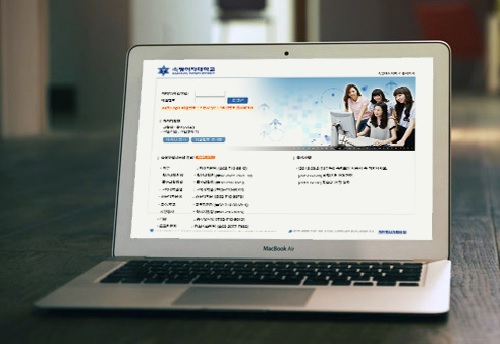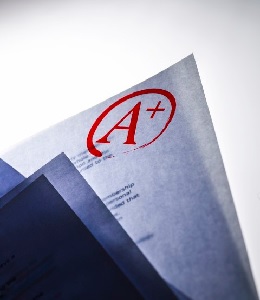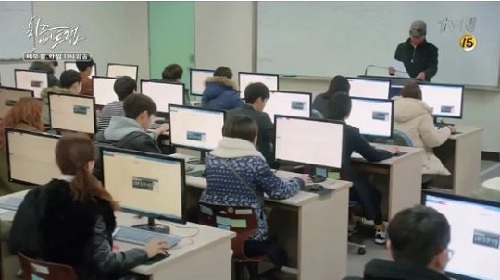
Course registration has yet again come upon us. Sookmyungians will be busy setting up their timetables for the coming term. When deciding which courses to enroll in, students often take into consideration comments like “this course will kill your GPA.” Too often than not, these comments are taken much too seriously and there is a long hesitation before clicking register. All Sookmyungians fear for low grades. This is the reality of course registration. What has caused this to come about?

Grade Point Average
Course registration is considered an important task that all university students must face. Failing to register for courses during the enrollment period could result in a failure to enter a specific course later, which could prove devastating if it is a mandatory course for graduation. The main purpose of university is to provide education that meets the wants of students. Students should not have to go through such a stressful timetable creation period. They should be able to freely register for any course they are interested in taking. The harsh reality is that wants and needs are different. Students hesitate to enroll in lectures, even though they have an interest in the subject matter, because of comments uploaded on various websites that warn of the difficulty of obtaining a high grade in the course. Failure to get a high grade then results in a lowering of one’s GPA or Grade Point Average.
According to a survey done by Albamon, students tend to register for courses that will ensure them a high grade at the end of the course rather than registering for courses out of interest. Among the 1,205 surveyed students, 16.2% said they enroll in courses where they have little pressure and a small workload and there is a high probability of obtaining a high grade. 15.6% said that they consider lecturers’ material quality and reputation and 14.5% said they enroll in courses that will result in a compact timetable. Only 13.2% of surveyed students said they consider interest when enrolling in courses.1) In other words, the key factor for course registration is the likelihood of a high grade at the end of the course. Also, among the 1,205 participants, 40.2% claimed to be dissatisfied with their final timetable allocations and often were unable to get into courses they wanted.2) This unique enrollment method is not restricted to Sookmyung Women’s University. Most students across all universities in Korea register courses for this reason.
Why Do Students Long for a High GPA?
GPA greatly affects future employment. In other words, students who have low GPA scores face harder times seeking employment than those who have high GPA scores. Also, according to research, human resources directors consider job related certificates (46.8%) to be the most important factor when deciding whether to hire a recent graduate, but the second most valued fact is the student’s GPA (29.1%).3) With students’ overall grades influencing their career paths, students have no other alternative but to register for courses that will lead to the best opportunity to receive a high grade.
GPA score affects not only students’ career paths, but also their immediate present as well. At the end of each semester, most universities award scholarships to students who obtained high GPA scores. Some schools even award additional merit to students who obtained high GPA scores when they apply for school sponsored programs. For instance, at Sookmyung Women’s University, the program Global Visitor sponsors students who are accepted into the program. Students with high GPA scores are allotted additional merit and thus are at an advantage over students with low GPA scores. Because of their advantages from a high GPA score, students aim each semester to get top grades.
In some universities, students with high GPA scores are also given the opportunity to register for courses before all others. At Sookmyung Women’s University, registration priority is allotted based on this ranking: school year, credits earned the previous semester, and overall GPA. Since overall GPA is last on the list, some may say this is fair across all students. However, students in the same academic year almost always enroll in the same number of credits each semester, so course registration really depends on GPA. Also, students who have a GPA of 3.7/4.3 or higher receive an additional 3 credits and which means they received that are higher than other students who didn’t receive additional credits. This registration priority ranking list makes it easy for students who are successful once to continue to successfully register for easy courses until their final semester at school. Other students, having failed to enter those ‘easy-to-get-A’ courses, will continue to have low GPA scores. That is, students with high GPA scores have less difficulty entering courses that are ‘easy’ each semester until they graduate.

A Vicious Cycle
One of the most serious issues is that students are not registering for courses that would increase their knowledge and information about a particular subject matter. Kim Mijung, a Visual Production’ 15 at Dong-Ah Institute of Media and Arts, said, “I limit myself to only one course of interest each semester and fill the rest of my timetable with courses in which I am sure to get a high grade to guarantee I obtain a high GPA at the end of the semester.” In other words, students are not expanding their knowledge or creativity due to the fear of not finding a job later after graduation. One’s GPA is more important that expanding knowledge or taking something out of interest.
Another problem popping up is the selling and buying of enrollment in ‘easy’ courses. Students are selling and buying their rights to certain courses. Students registered in courses that other students want are making money by selling their ‘seats’. At Hallym University, online posts are popping up more and more frequently of students claiming to have paid up to 4 million won for another student’s seat in an ‘easy’ course.4) Students, despite the extra financial burden, are more than willing to pay for the seat in the easy course as it will ensure they maintain or increase their GPA score. Such dealings are illegal and unfair to students who cannot afford such lavish deals. Thus, only students who can afford the transaction gain opportunities to a higher GPA.

For a Better Community
Lim Heesung, Researcher at Korea Higher Education Research Institute, said, “The only way to realistically deal with the current situation is to invest more in education by hiring more professors and increasing the number of courses offered by the universities.”5) Unless social structure makes a complete overhaul, this may be the only realistic choice. The Sookmyung Times hopes for more sensible and practical solutions as soon as possible.

1) Choi Ji Soo, “GPA the Most Important Factor for University Students During Course Registration… Interest only Accounts for 13.2%”, Kookje News, August 30, 2016
2) Same as 1
3) Kang Eunkyeong, “Click Fast to Register For an Easy Course, Regional Universities face Enrollment Chaos”, CCToday, August 1 6, 2016
4) Park Halim, “Hallym University Seats for Money, Students Willingly Pay More for A Seat in University Courses Despite Already Paying School Tuition”, News1, February 9, 2017
5) La Jinju, “Enrollment Solutions—Fundamental Reason Should Be Solved Preferentially than Conciliation”, NewsTomato, April 5, 2016


